An Analysis of Tort Law Principles in Mortgage Cases: Cuckmere & Kew
VerifiedAdded on 2023/01/13
|8
|2368
|88
Essay
AI Summary
This essay delves into the application of tort law within the context of mortgage disputes, primarily focusing on the cases of Cuckmere Brick Co v Mutual Finance and Kew Construction Ltd. The essay examines the responsibilities and rights of both mortgagees and mortgagors, particularly concerning the sale of mortgaged properties. It analyzes the legal principles surrounding the duty of care, the right of redemption, and the powers of sale, highlighting the potential liabilities of mortgagees who fail to act in good faith or adhere to proper procedures. The essay also explores the implications of these legal principles on property law and provides a comprehensive understanding of the legal framework governing mortgage agreements and the resolution of related disputes, offering a thorough analysis of relevant case law and legal concepts.

ESSAY
Paraphrase This Document
Need a fresh take? Get an instant paraphrase of this document with our AI Paraphraser
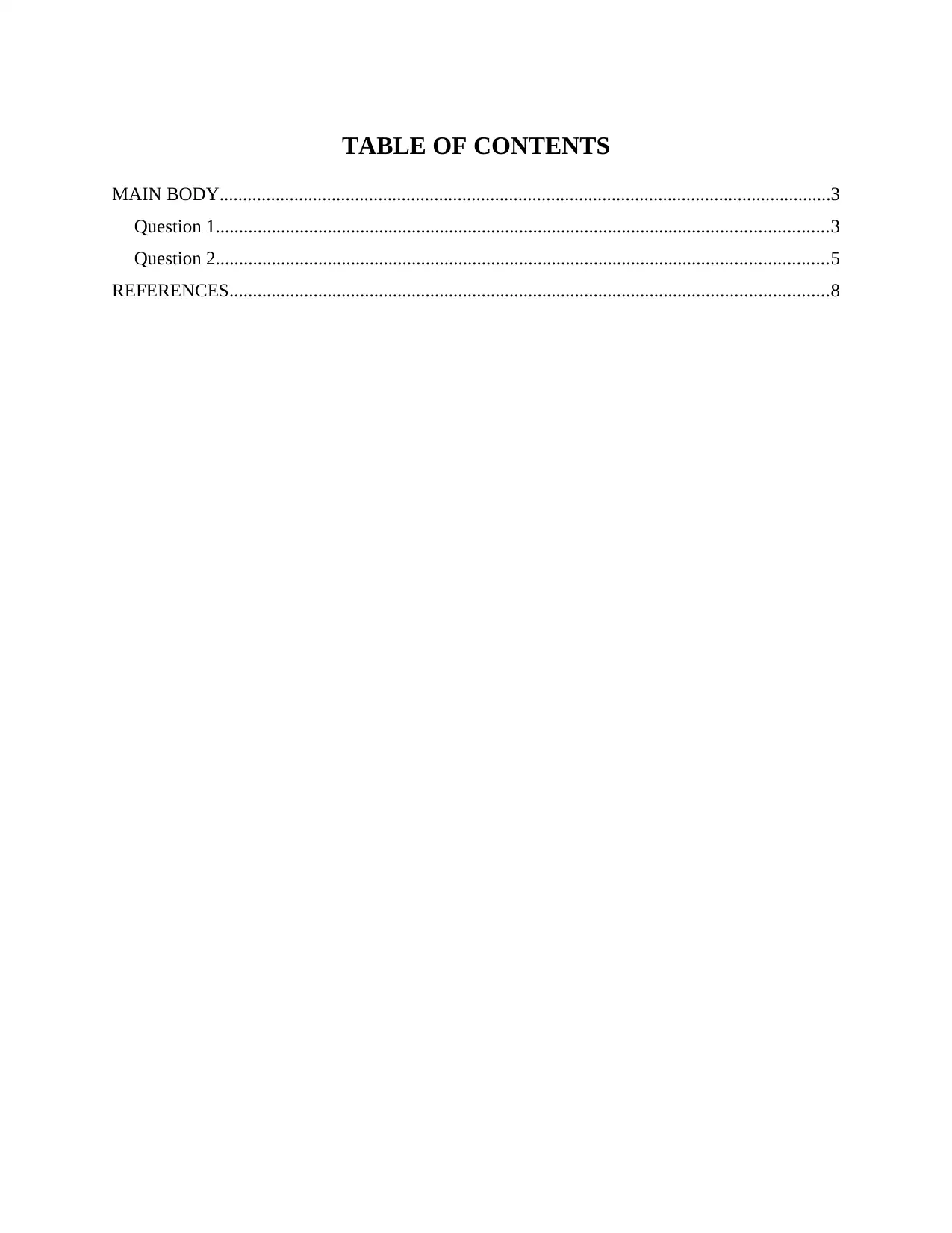
TABLE OF CONTENTS
MAIN BODY...................................................................................................................................3
Question 1...................................................................................................................................3
Question 2...................................................................................................................................5
REFERENCES................................................................................................................................8
MAIN BODY...................................................................................................................................3
Question 1...................................................................................................................................3
Question 2...................................................................................................................................5
REFERENCES................................................................................................................................8
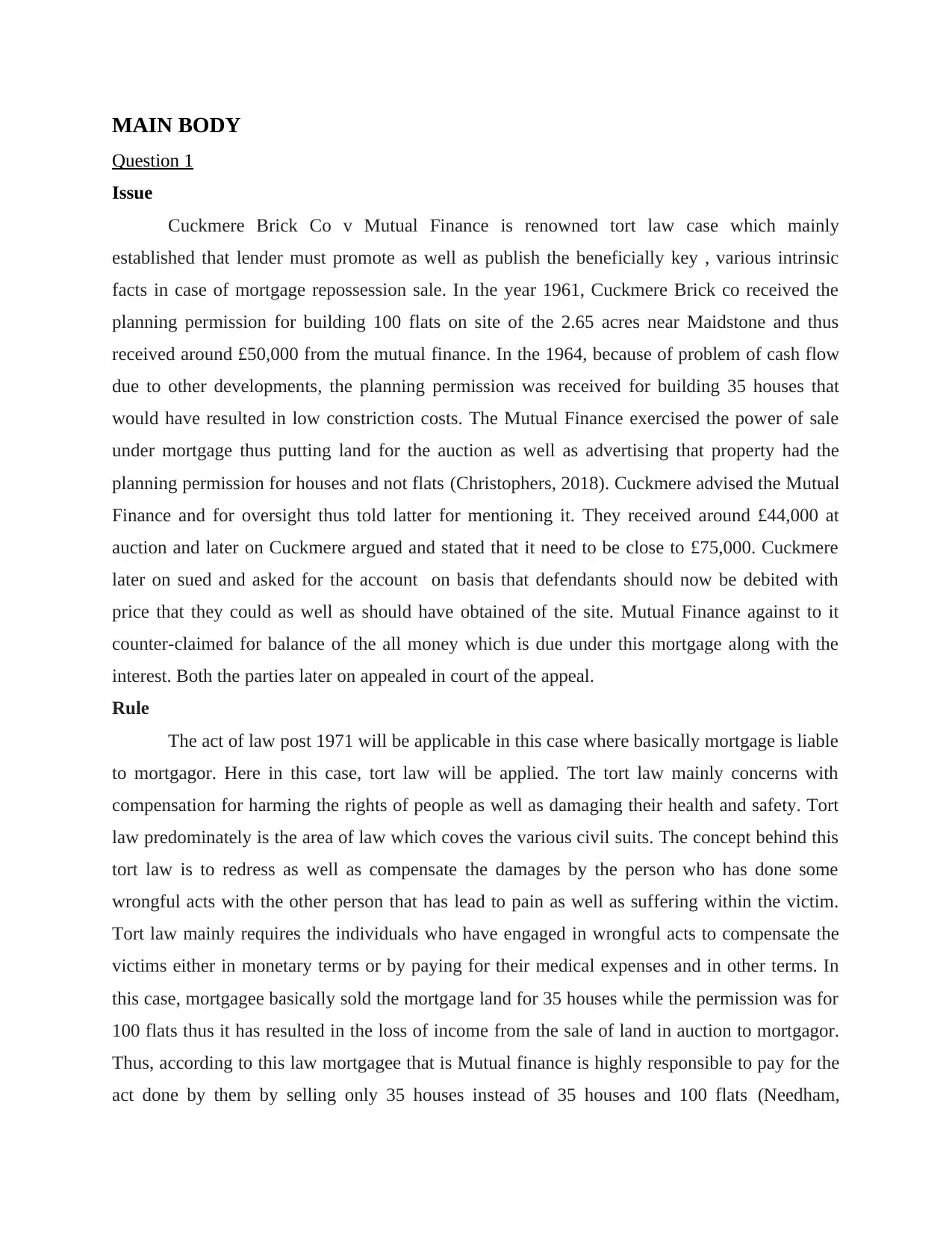
MAIN BODY
Question 1
Issue
Cuckmere Brick Co v Mutual Finance is renowned tort law case which mainly
established that lender must promote as well as publish the beneficially key , various intrinsic
facts in case of mortgage repossession sale. In the year 1961, Cuckmere Brick co received the
planning permission for building 100 flats on site of the 2.65 acres near Maidstone and thus
received around £50,000 from the mutual finance. In the 1964, because of problem of cash flow
due to other developments, the planning permission was received for building 35 houses that
would have resulted in low constriction costs. The Mutual Finance exercised the power of sale
under mortgage thus putting land for the auction as well as advertising that property had the
planning permission for houses and not flats (Christophers, 2018). Cuckmere advised the Mutual
Finance and for oversight thus told latter for mentioning it. They received around £44,000 at
auction and later on Cuckmere argued and stated that it need to be close to £75,000. Cuckmere
later on sued and asked for the account on basis that defendants should now be debited with
price that they could as well as should have obtained of the site. Mutual Finance against to it
counter-claimed for balance of the all money which is due under this mortgage along with the
interest. Both the parties later on appealed in court of the appeal.
Rule
The act of law post 1971 will be applicable in this case where basically mortgage is liable
to mortgagor. Here in this case, tort law will be applied. The tort law mainly concerns with
compensation for harming the rights of people as well as damaging their health and safety. Tort
law predominately is the area of law which coves the various civil suits. The concept behind this
tort law is to redress as well as compensate the damages by the person who has done some
wrongful acts with the other person that has lead to pain as well as suffering within the victim.
Tort law mainly requires the individuals who have engaged in wrongful acts to compensate the
victims either in monetary terms or by paying for their medical expenses and in other terms. In
this case, mortgagee basically sold the mortgage land for 35 houses while the permission was for
100 flats thus it has resulted in the loss of income from the sale of land in auction to mortgagor.
Thus, according to this law mortgagee that is Mutual finance is highly responsible to pay for the
act done by them by selling only 35 houses instead of 35 houses and 100 flats (Needham,
Question 1
Issue
Cuckmere Brick Co v Mutual Finance is renowned tort law case which mainly
established that lender must promote as well as publish the beneficially key , various intrinsic
facts in case of mortgage repossession sale. In the year 1961, Cuckmere Brick co received the
planning permission for building 100 flats on site of the 2.65 acres near Maidstone and thus
received around £50,000 from the mutual finance. In the 1964, because of problem of cash flow
due to other developments, the planning permission was received for building 35 houses that
would have resulted in low constriction costs. The Mutual Finance exercised the power of sale
under mortgage thus putting land for the auction as well as advertising that property had the
planning permission for houses and not flats (Christophers, 2018). Cuckmere advised the Mutual
Finance and for oversight thus told latter for mentioning it. They received around £44,000 at
auction and later on Cuckmere argued and stated that it need to be close to £75,000. Cuckmere
later on sued and asked for the account on basis that defendants should now be debited with
price that they could as well as should have obtained of the site. Mutual Finance against to it
counter-claimed for balance of the all money which is due under this mortgage along with the
interest. Both the parties later on appealed in court of the appeal.
Rule
The act of law post 1971 will be applicable in this case where basically mortgage is liable
to mortgagor. Here in this case, tort law will be applied. The tort law mainly concerns with
compensation for harming the rights of people as well as damaging their health and safety. Tort
law predominately is the area of law which coves the various civil suits. The concept behind this
tort law is to redress as well as compensate the damages by the person who has done some
wrongful acts with the other person that has lead to pain as well as suffering within the victim.
Tort law mainly requires the individuals who have engaged in wrongful acts to compensate the
victims either in monetary terms or by paying for their medical expenses and in other terms. In
this case, mortgagee basically sold the mortgage land for 35 houses while the permission was for
100 flats thus it has resulted in the loss of income from the sale of land in auction to mortgagor.
Thus, according to this law mortgagee that is Mutual finance is highly responsible to pay for the
act done by them by selling only 35 houses instead of 35 houses and 100 flats (Needham,
⊘ This is a preview!⊘
Do you want full access?
Subscribe today to unlock all pages.

Trusted by 1+ million students worldwide
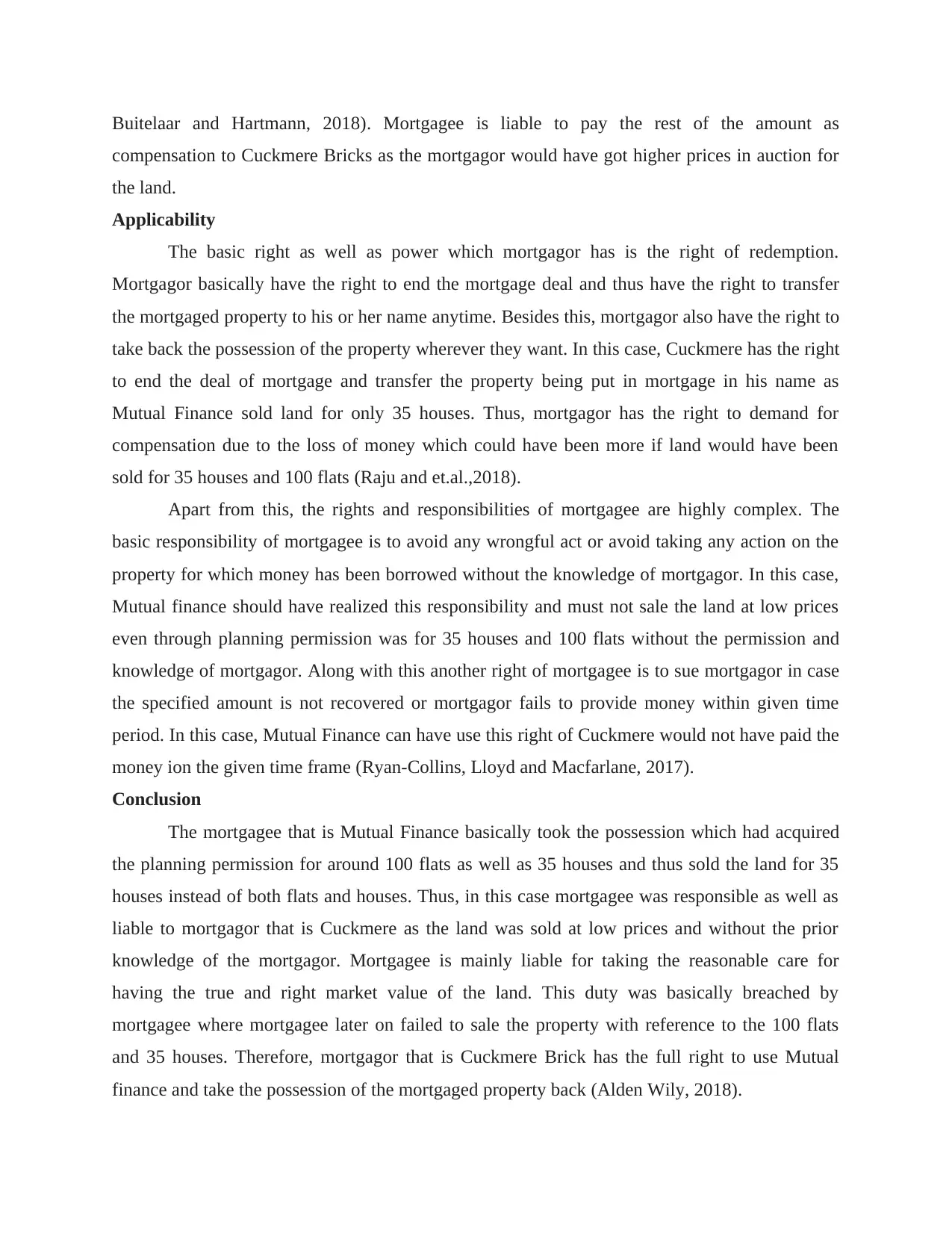
Buitelaar and Hartmann, 2018). Mortgagee is liable to pay the rest of the amount as
compensation to Cuckmere Bricks as the mortgagor would have got higher prices in auction for
the land.
Applicability
The basic right as well as power which mortgagor has is the right of redemption.
Mortgagor basically have the right to end the mortgage deal and thus have the right to transfer
the mortgaged property to his or her name anytime. Besides this, mortgagor also have the right to
take back the possession of the property wherever they want. In this case, Cuckmere has the right
to end the deal of mortgage and transfer the property being put in mortgage in his name as
Mutual Finance sold land for only 35 houses. Thus, mortgagor has the right to demand for
compensation due to the loss of money which could have been more if land would have been
sold for 35 houses and 100 flats (Raju and et.al.,2018).
Apart from this, the rights and responsibilities of mortgagee are highly complex. The
basic responsibility of mortgagee is to avoid any wrongful act or avoid taking any action on the
property for which money has been borrowed without the knowledge of mortgagor. In this case,
Mutual finance should have realized this responsibility and must not sale the land at low prices
even through planning permission was for 35 houses and 100 flats without the permission and
knowledge of mortgagor. Along with this another right of mortgagee is to sue mortgagor in case
the specified amount is not recovered or mortgagor fails to provide money within given time
period. In this case, Mutual Finance can have use this right of Cuckmere would not have paid the
money ion the given time frame (Ryan-Collins, Lloyd and Macfarlane, 2017).
Conclusion
The mortgagee that is Mutual Finance basically took the possession which had acquired
the planning permission for around 100 flats as well as 35 houses and thus sold the land for 35
houses instead of both flats and houses. Thus, in this case mortgagee was responsible as well as
liable to mortgagor that is Cuckmere as the land was sold at low prices and without the prior
knowledge of the mortgagor. Mortgagee is mainly liable for taking the reasonable care for
having the true and right market value of the land. This duty was basically breached by
mortgagee where mortgagee later on failed to sale the property with reference to the 100 flats
and 35 houses. Therefore, mortgagor that is Cuckmere Brick has the full right to use Mutual
finance and take the possession of the mortgaged property back (Alden Wily, 2018).
compensation to Cuckmere Bricks as the mortgagor would have got higher prices in auction for
the land.
Applicability
The basic right as well as power which mortgagor has is the right of redemption.
Mortgagor basically have the right to end the mortgage deal and thus have the right to transfer
the mortgaged property to his or her name anytime. Besides this, mortgagor also have the right to
take back the possession of the property wherever they want. In this case, Cuckmere has the right
to end the deal of mortgage and transfer the property being put in mortgage in his name as
Mutual Finance sold land for only 35 houses. Thus, mortgagor has the right to demand for
compensation due to the loss of money which could have been more if land would have been
sold for 35 houses and 100 flats (Raju and et.al.,2018).
Apart from this, the rights and responsibilities of mortgagee are highly complex. The
basic responsibility of mortgagee is to avoid any wrongful act or avoid taking any action on the
property for which money has been borrowed without the knowledge of mortgagor. In this case,
Mutual finance should have realized this responsibility and must not sale the land at low prices
even through planning permission was for 35 houses and 100 flats without the permission and
knowledge of mortgagor. Along with this another right of mortgagee is to sue mortgagor in case
the specified amount is not recovered or mortgagor fails to provide money within given time
period. In this case, Mutual Finance can have use this right of Cuckmere would not have paid the
money ion the given time frame (Ryan-Collins, Lloyd and Macfarlane, 2017).
Conclusion
The mortgagee that is Mutual Finance basically took the possession which had acquired
the planning permission for around 100 flats as well as 35 houses and thus sold the land for 35
houses instead of both flats and houses. Thus, in this case mortgagee was responsible as well as
liable to mortgagor that is Cuckmere as the land was sold at low prices and without the prior
knowledge of the mortgagor. Mortgagee is mainly liable for taking the reasonable care for
having the true and right market value of the land. This duty was basically breached by
mortgagee where mortgagee later on failed to sale the property with reference to the 100 flats
and 35 houses. Therefore, mortgagor that is Cuckmere Brick has the full right to use Mutual
finance and take the possession of the mortgaged property back (Alden Wily, 2018).
Paraphrase This Document
Need a fresh take? Get an instant paraphrase of this document with our AI Paraphraser
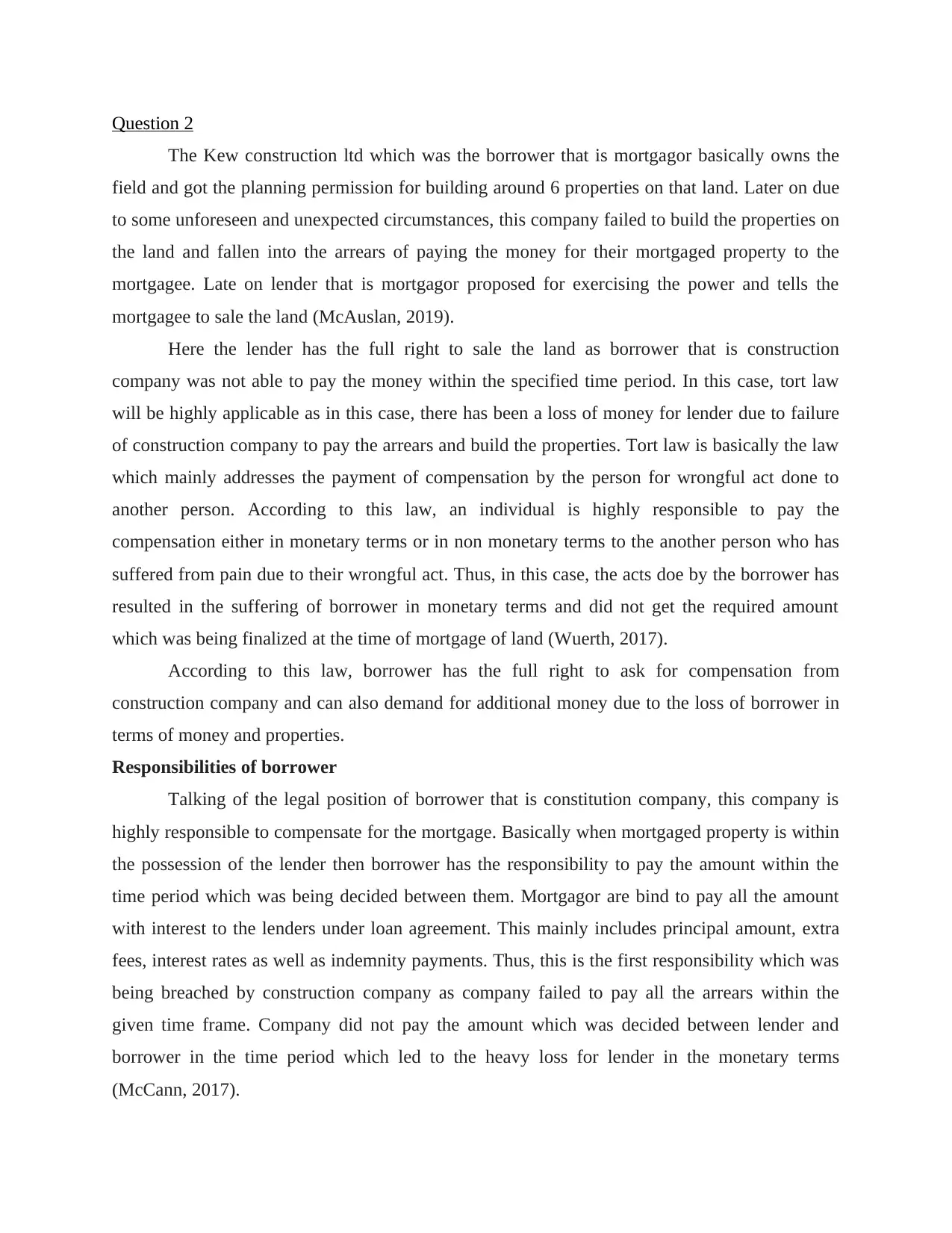
Question 2
The Kew construction ltd which was the borrower that is mortgagor basically owns the
field and got the planning permission for building around 6 properties on that land. Later on due
to some unforeseen and unexpected circumstances, this company failed to build the properties on
the land and fallen into the arrears of paying the money for their mortgaged property to the
mortgagee. Late on lender that is mortgagor proposed for exercising the power and tells the
mortgagee to sale the land (McAuslan, 2019).
Here the lender has the full right to sale the land as borrower that is construction
company was not able to pay the money within the specified time period. In this case, tort law
will be highly applicable as in this case, there has been a loss of money for lender due to failure
of construction company to pay the arrears and build the properties. Tort law is basically the law
which mainly addresses the payment of compensation by the person for wrongful act done to
another person. According to this law, an individual is highly responsible to pay the
compensation either in monetary terms or in non monetary terms to the another person who has
suffered from pain due to their wrongful act. Thus, in this case, the acts doe by the borrower has
resulted in the suffering of borrower in monetary terms and did not get the required amount
which was being finalized at the time of mortgage of land (Wuerth, 2017).
According to this law, borrower has the full right to ask for compensation from
construction company and can also demand for additional money due to the loss of borrower in
terms of money and properties.
Responsibilities of borrower
Talking of the legal position of borrower that is constitution company, this company is
highly responsible to compensate for the mortgage. Basically when mortgaged property is within
the possession of the lender then borrower has the responsibility to pay the amount within the
time period which was being decided between them. Mortgagor are bind to pay all the amount
with interest to the lenders under loan agreement. This mainly includes principal amount, extra
fees, interest rates as well as indemnity payments. Thus, this is the first responsibility which was
being breached by construction company as company failed to pay all the arrears within the
given time frame. Company did not pay the amount which was decided between lender and
borrower in the time period which led to the heavy loss for lender in the monetary terms
(McCann, 2017).
The Kew construction ltd which was the borrower that is mortgagor basically owns the
field and got the planning permission for building around 6 properties on that land. Later on due
to some unforeseen and unexpected circumstances, this company failed to build the properties on
the land and fallen into the arrears of paying the money for their mortgaged property to the
mortgagee. Late on lender that is mortgagor proposed for exercising the power and tells the
mortgagee to sale the land (McAuslan, 2019).
Here the lender has the full right to sale the land as borrower that is construction
company was not able to pay the money within the specified time period. In this case, tort law
will be highly applicable as in this case, there has been a loss of money for lender due to failure
of construction company to pay the arrears and build the properties. Tort law is basically the law
which mainly addresses the payment of compensation by the person for wrongful act done to
another person. According to this law, an individual is highly responsible to pay the
compensation either in monetary terms or in non monetary terms to the another person who has
suffered from pain due to their wrongful act. Thus, in this case, the acts doe by the borrower has
resulted in the suffering of borrower in monetary terms and did not get the required amount
which was being finalized at the time of mortgage of land (Wuerth, 2017).
According to this law, borrower has the full right to ask for compensation from
construction company and can also demand for additional money due to the loss of borrower in
terms of money and properties.
Responsibilities of borrower
Talking of the legal position of borrower that is constitution company, this company is
highly responsible to compensate for the mortgage. Basically when mortgaged property is within
the possession of the lender then borrower has the responsibility to pay the amount within the
time period which was being decided between them. Mortgagor are bind to pay all the amount
with interest to the lenders under loan agreement. This mainly includes principal amount, extra
fees, interest rates as well as indemnity payments. Thus, this is the first responsibility which was
being breached by construction company as company failed to pay all the arrears within the
given time frame. Company did not pay the amount which was decided between lender and
borrower in the time period which led to the heavy loss for lender in the monetary terms
(McCann, 2017).
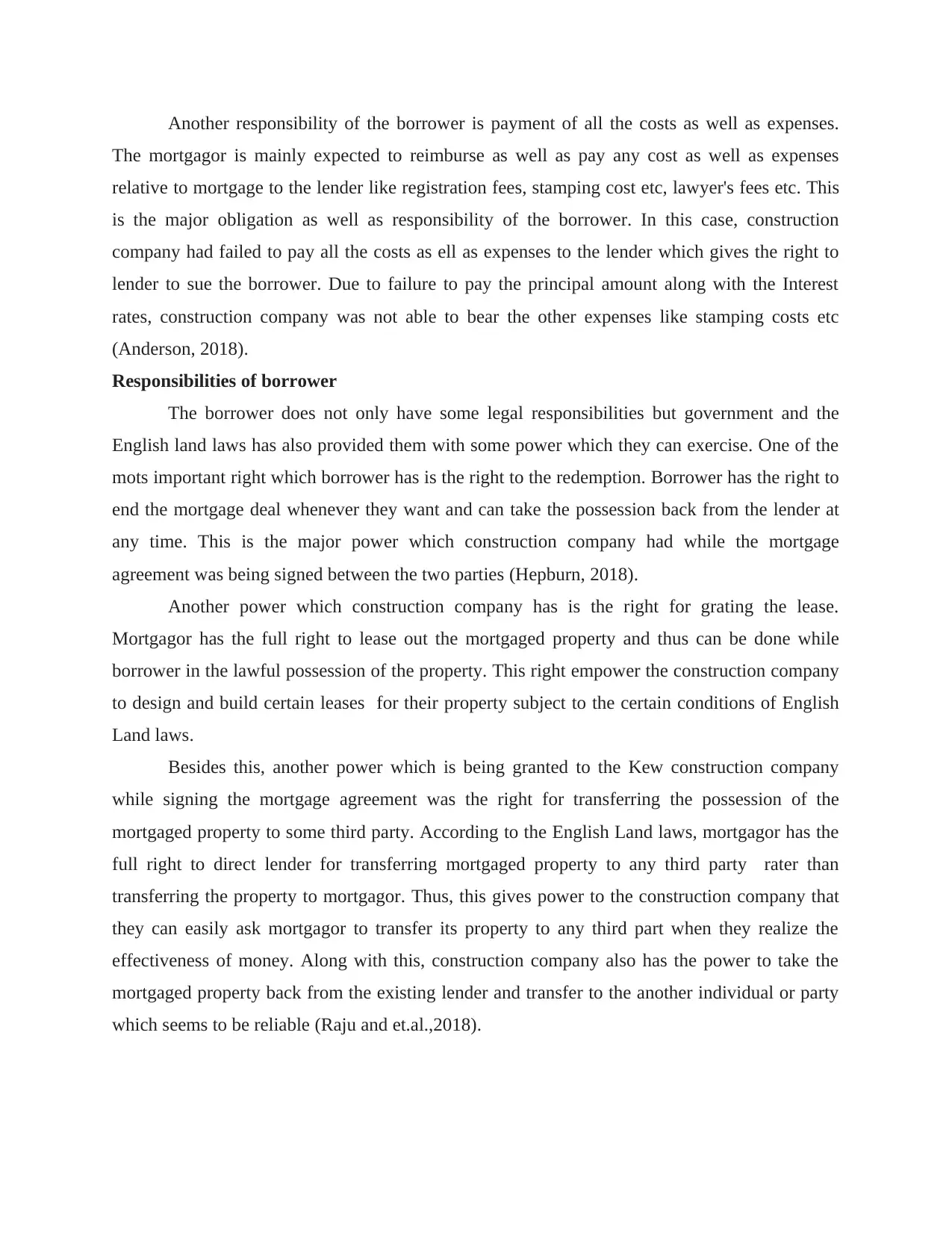
Another responsibility of the borrower is payment of all the costs as well as expenses.
The mortgagor is mainly expected to reimburse as well as pay any cost as well as expenses
relative to mortgage to the lender like registration fees, stamping cost etc, lawyer's fees etc. This
is the major obligation as well as responsibility of the borrower. In this case, construction
company had failed to pay all the costs as ell as expenses to the lender which gives the right to
lender to sue the borrower. Due to failure to pay the principal amount along with the Interest
rates, construction company was not able to bear the other expenses like stamping costs etc
(Anderson, 2018).
Responsibilities of borrower
The borrower does not only have some legal responsibilities but government and the
English land laws has also provided them with some power which they can exercise. One of the
mots important right which borrower has is the right to the redemption. Borrower has the right to
end the mortgage deal whenever they want and can take the possession back from the lender at
any time. This is the major power which construction company had while the mortgage
agreement was being signed between the two parties (Hepburn, 2018).
Another power which construction company has is the right for grating the lease.
Mortgagor has the full right to lease out the mortgaged property and thus can be done while
borrower in the lawful possession of the property. This right empower the construction company
to design and build certain leases for their property subject to the certain conditions of English
Land laws.
Besides this, another power which is being granted to the Kew construction company
while signing the mortgage agreement was the right for transferring the possession of the
mortgaged property to some third party. According to the English Land laws, mortgagor has the
full right to direct lender for transferring mortgaged property to any third party rater than
transferring the property to mortgagor. Thus, this gives power to the construction company that
they can easily ask mortgagor to transfer its property to any third part when they realize the
effectiveness of money. Along with this, construction company also has the power to take the
mortgaged property back from the existing lender and transfer to the another individual or party
which seems to be reliable (Raju and et.al.,2018).
The mortgagor is mainly expected to reimburse as well as pay any cost as well as expenses
relative to mortgage to the lender like registration fees, stamping cost etc, lawyer's fees etc. This
is the major obligation as well as responsibility of the borrower. In this case, construction
company had failed to pay all the costs as ell as expenses to the lender which gives the right to
lender to sue the borrower. Due to failure to pay the principal amount along with the Interest
rates, construction company was not able to bear the other expenses like stamping costs etc
(Anderson, 2018).
Responsibilities of borrower
The borrower does not only have some legal responsibilities but government and the
English land laws has also provided them with some power which they can exercise. One of the
mots important right which borrower has is the right to the redemption. Borrower has the right to
end the mortgage deal whenever they want and can take the possession back from the lender at
any time. This is the major power which construction company had while the mortgage
agreement was being signed between the two parties (Hepburn, 2018).
Another power which construction company has is the right for grating the lease.
Mortgagor has the full right to lease out the mortgaged property and thus can be done while
borrower in the lawful possession of the property. This right empower the construction company
to design and build certain leases for their property subject to the certain conditions of English
Land laws.
Besides this, another power which is being granted to the Kew construction company
while signing the mortgage agreement was the right for transferring the possession of the
mortgaged property to some third party. According to the English Land laws, mortgagor has the
full right to direct lender for transferring mortgaged property to any third party rater than
transferring the property to mortgagor. Thus, this gives power to the construction company that
they can easily ask mortgagor to transfer its property to any third part when they realize the
effectiveness of money. Along with this, construction company also has the power to take the
mortgaged property back from the existing lender and transfer to the another individual or party
which seems to be reliable (Raju and et.al.,2018).
⊘ This is a preview!⊘
Do you want full access?
Subscribe today to unlock all pages.

Trusted by 1+ million students worldwide
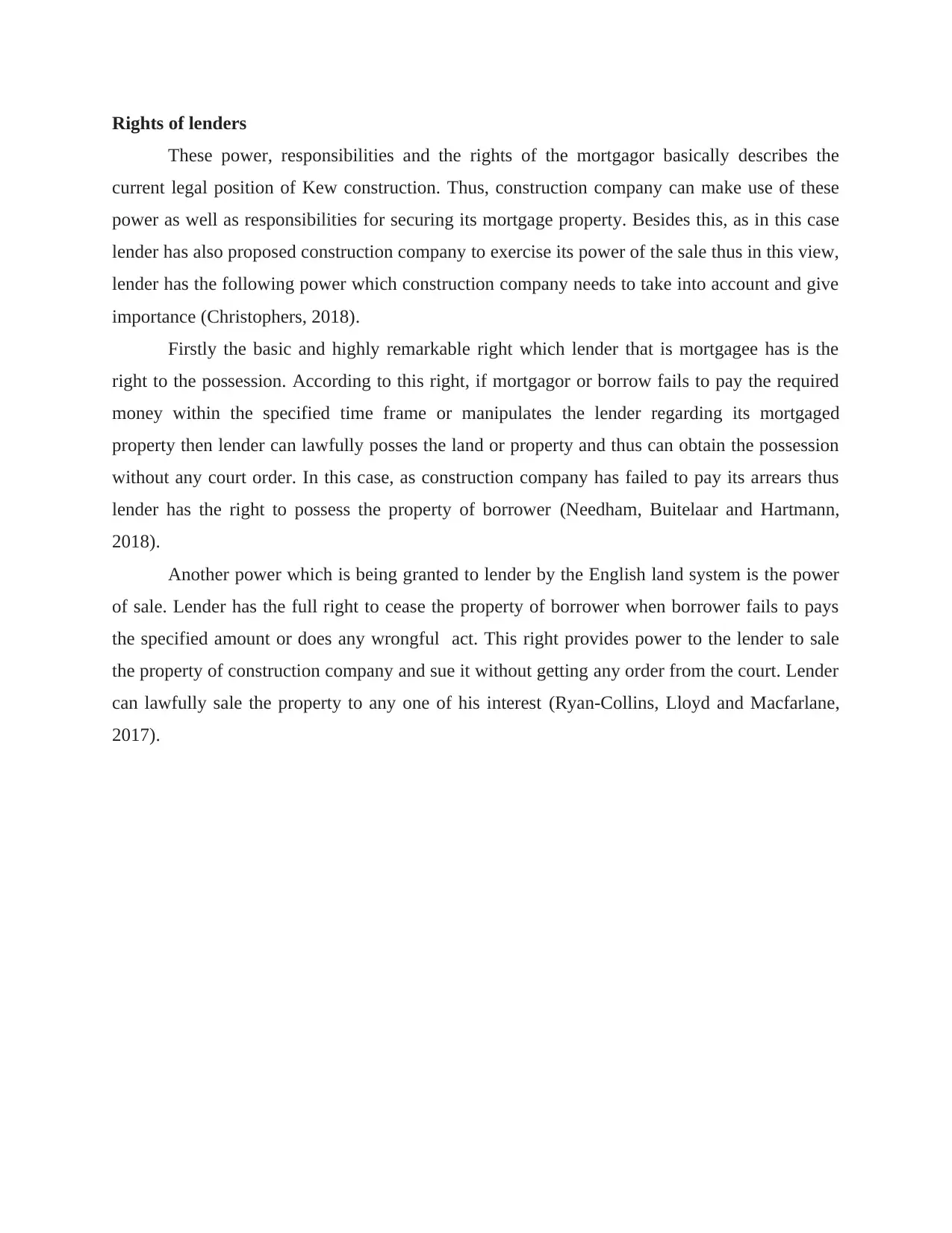
Rights of lenders
These power, responsibilities and the rights of the mortgagor basically describes the
current legal position of Kew construction. Thus, construction company can make use of these
power as well as responsibilities for securing its mortgage property. Besides this, as in this case
lender has also proposed construction company to exercise its power of the sale thus in this view,
lender has the following power which construction company needs to take into account and give
importance (Christophers, 2018).
Firstly the basic and highly remarkable right which lender that is mortgagee has is the
right to the possession. According to this right, if mortgagor or borrow fails to pay the required
money within the specified time frame or manipulates the lender regarding its mortgaged
property then lender can lawfully posses the land or property and thus can obtain the possession
without any court order. In this case, as construction company has failed to pay its arrears thus
lender has the right to possess the property of borrower (Needham, Buitelaar and Hartmann,
2018).
Another power which is being granted to lender by the English land system is the power
of sale. Lender has the full right to cease the property of borrower when borrower fails to pays
the specified amount or does any wrongful act. This right provides power to the lender to sale
the property of construction company and sue it without getting any order from the court. Lender
can lawfully sale the property to any one of his interest (Ryan-Collins, Lloyd and Macfarlane,
2017).
These power, responsibilities and the rights of the mortgagor basically describes the
current legal position of Kew construction. Thus, construction company can make use of these
power as well as responsibilities for securing its mortgage property. Besides this, as in this case
lender has also proposed construction company to exercise its power of the sale thus in this view,
lender has the following power which construction company needs to take into account and give
importance (Christophers, 2018).
Firstly the basic and highly remarkable right which lender that is mortgagee has is the
right to the possession. According to this right, if mortgagor or borrow fails to pay the required
money within the specified time frame or manipulates the lender regarding its mortgaged
property then lender can lawfully posses the land or property and thus can obtain the possession
without any court order. In this case, as construction company has failed to pay its arrears thus
lender has the right to possess the property of borrower (Needham, Buitelaar and Hartmann,
2018).
Another power which is being granted to lender by the English land system is the power
of sale. Lender has the full right to cease the property of borrower when borrower fails to pays
the specified amount or does any wrongful act. This right provides power to the lender to sale
the property of construction company and sue it without getting any order from the court. Lender
can lawfully sale the property to any one of his interest (Ryan-Collins, Lloyd and Macfarlane,
2017).
Paraphrase This Document
Need a fresh take? Get an instant paraphrase of this document with our AI Paraphraser
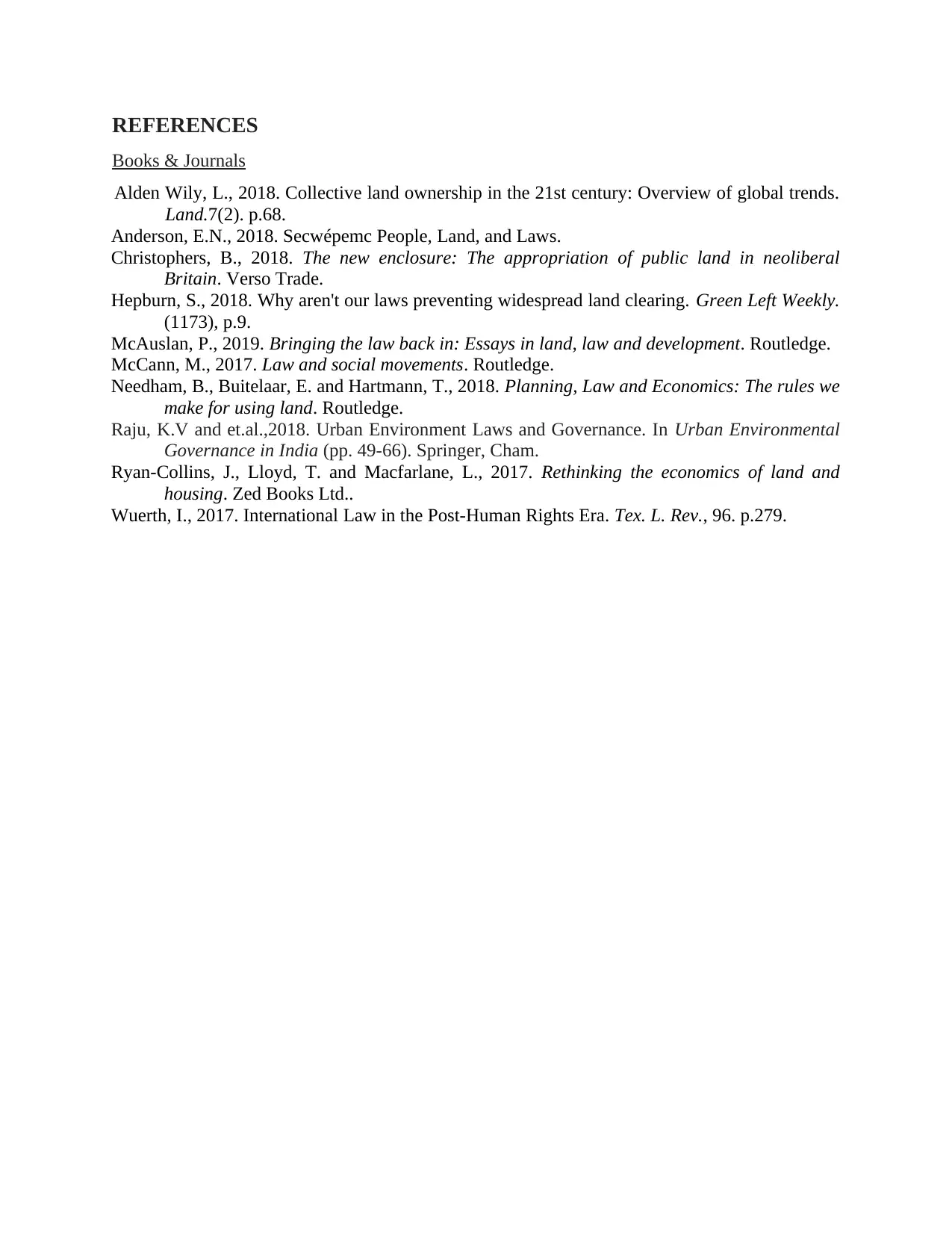
REFERENCES
Books & Journals
Alden Wily, L., 2018. Collective land ownership in the 21st century: Overview of global trends.
Land.7(2). p.68.
Anderson, E.N., 2018. Secwépemc People, Land, and Laws.
Christophers, B., 2018. The new enclosure: The appropriation of public land in neoliberal
Britain. Verso Trade.
Hepburn, S., 2018. Why aren't our laws preventing widespread land clearing. Green Left Weekly.
(1173), p.9.
McAuslan, P., 2019. Bringing the law back in: Essays in land, law and development. Routledge.
McCann, M., 2017. Law and social movements. Routledge.
Needham, B., Buitelaar, E. and Hartmann, T., 2018. Planning, Law and Economics: The rules we
make for using land. Routledge.
Raju, K.V and et.al.,2018. Urban Environment Laws and Governance. In Urban Environmental
Governance in India (pp. 49-66). Springer, Cham.
Ryan-Collins, J., Lloyd, T. and Macfarlane, L., 2017. Rethinking the economics of land and
housing. Zed Books Ltd..
Wuerth, I., 2017. International Law in the Post-Human Rights Era. Tex. L. Rev., 96. p.279.
Books & Journals
Alden Wily, L., 2018. Collective land ownership in the 21st century: Overview of global trends.
Land.7(2). p.68.
Anderson, E.N., 2018. Secwépemc People, Land, and Laws.
Christophers, B., 2018. The new enclosure: The appropriation of public land in neoliberal
Britain. Verso Trade.
Hepburn, S., 2018. Why aren't our laws preventing widespread land clearing. Green Left Weekly.
(1173), p.9.
McAuslan, P., 2019. Bringing the law back in: Essays in land, law and development. Routledge.
McCann, M., 2017. Law and social movements. Routledge.
Needham, B., Buitelaar, E. and Hartmann, T., 2018. Planning, Law and Economics: The rules we
make for using land. Routledge.
Raju, K.V and et.al.,2018. Urban Environment Laws and Governance. In Urban Environmental
Governance in India (pp. 49-66). Springer, Cham.
Ryan-Collins, J., Lloyd, T. and Macfarlane, L., 2017. Rethinking the economics of land and
housing. Zed Books Ltd..
Wuerth, I., 2017. International Law in the Post-Human Rights Era. Tex. L. Rev., 96. p.279.
1 out of 8
Your All-in-One AI-Powered Toolkit for Academic Success.
+13062052269
info@desklib.com
Available 24*7 on WhatsApp / Email
![[object Object]](/_next/static/media/star-bottom.7253800d.svg)
Unlock your academic potential
Copyright © 2020–2025 A2Z Services. All Rights Reserved. Developed and managed by ZUCOL.